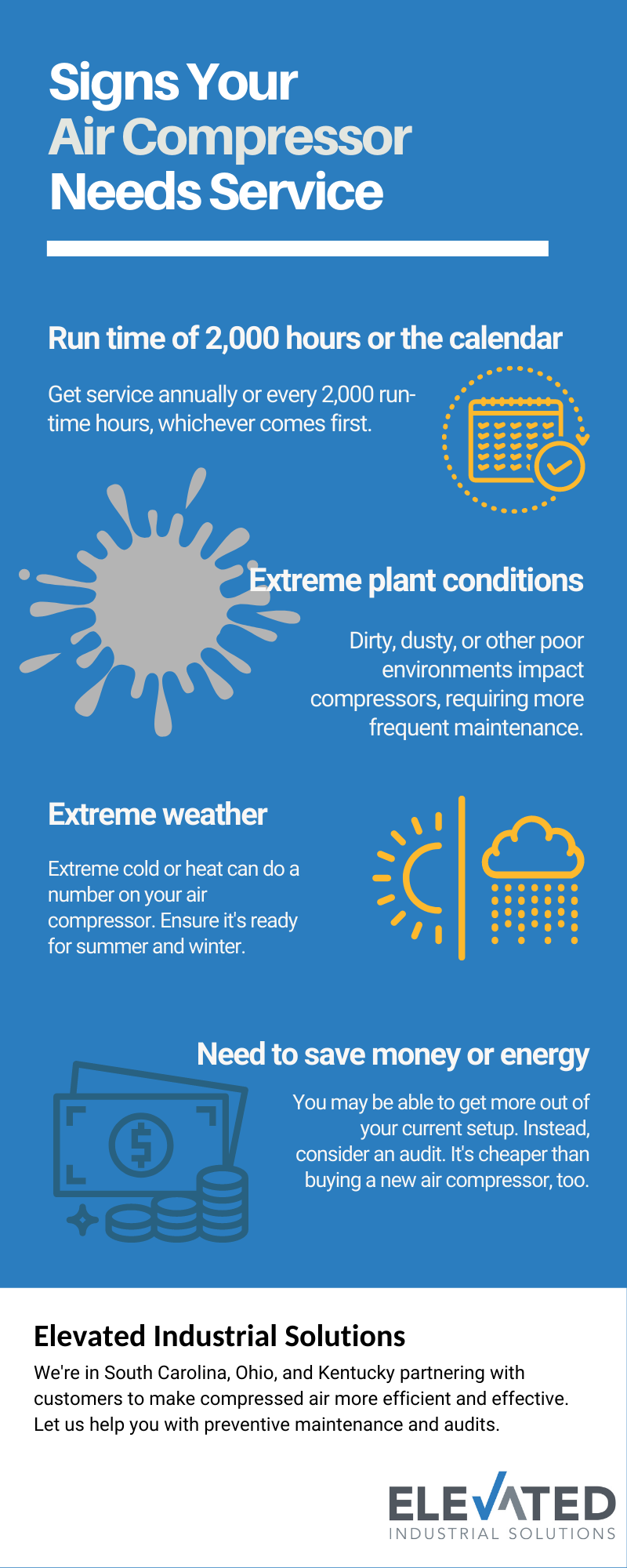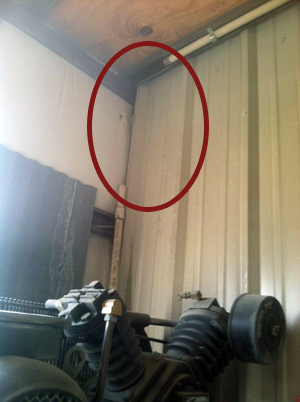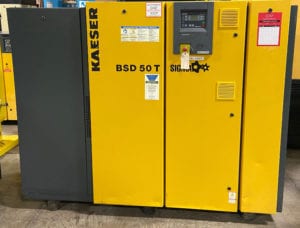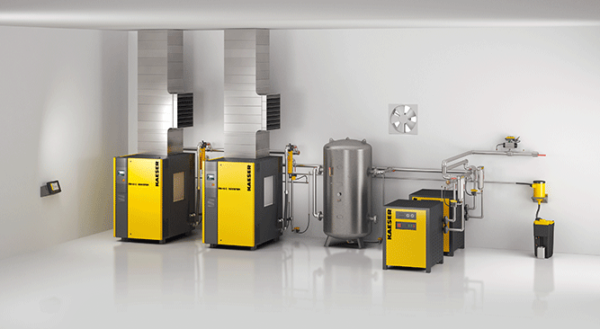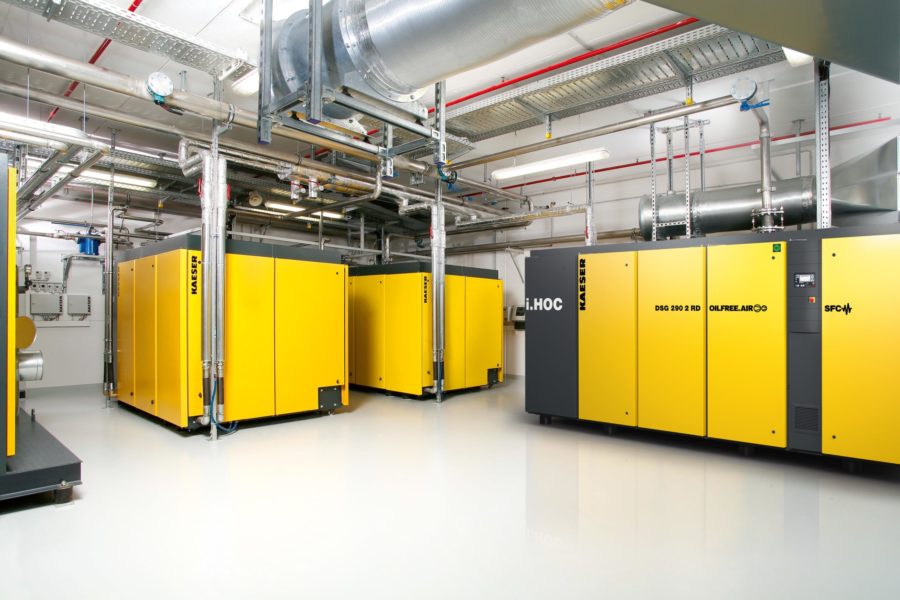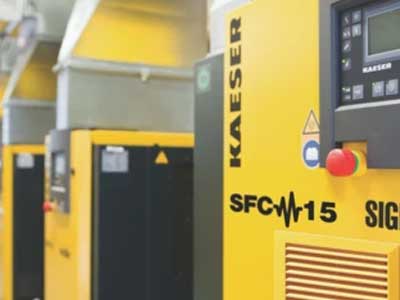Buying an air compressor is complicated and requires some expert knowledge. Not everyone involved in the buying process is a facility or plan engineer/manager, either. So we put together a guide to help you or help explain to others in your company what to look for.
Compressed air terms
To help you familiarize yourself with the terms concerning air compressors, turn to this shortlist of definitions that will be helpful for your next air compressor purchase:
- Pounds per Square Inch (PSI) — the measurement of air pressure and force that is delivered by an air compressor. Higher numbers mean that a larger volume of air can be compressed in the tank.
- Pounds per Square Inch Gauge (PSIG) — the measurement of air pressure and force that is delivered by an air compressor relative to our atmospheric pressure at sea level, which is 14.7 PSI. Most gauges are calibrated to read 0 at sea level so the 14.7 psi of the earth’s atmosphere is not measured.
- Actual Cubic Feet per Minute (ACFM) — the actual volume of air pumped in one minute from a compressor running at its rated operating conditions of speed, pressure, and temperatures.
- Standard Cubic Feet per Minute (SCFM) — the representation of the volume of air pumped in one minute at 60 degrees Fahrenheit (15.6 degrees Celsius). Some air compressors will be rated with SCFM to provide a more accurate working rating since air contracts and expands at different temperatures.
- Horsepower (HP) — the measurement of power the motor produces. The higher the number, the more work the air compressor can do to deliver a greater PSI and ACFM.
- Brake horsepower —Horsepower delivered to the output shaft of a motor or engine, or the horsepower required at the compressor shaft to perform work.
- Indicated horsepower —The horsepower is calculated from compressor indicator diagrams. The term applies only to displacement-type compressors.
- Intercooler — part of the air compressor that cools air between compression stages.
- Aftercooler — a heat exchanger used for cooling air discharged from a compressor. The resulting condensation may be removed by a moisture separator following the aftercooler.
- Pneumatic tools — tools that operate by air pressure.
- Positive displacement compressors —Compressors in which successive volumes of air or gas are confined within a closed space and space is mechanically reduced, resulting in compression. These may be reciprocating or rotating.
Air compressor options
Here are three general categories that air compressors fall into.
Consumer-grade air compressors. These models are perfect for simple jobs like inflating tires, sporting goods, and other inflatables. Most have the power to operate small-load air tools.
Professional-grade air compressors. These are designed to power more demanding tools, making them perfect for contractors, woodworking shops as well as small garages.
Commercial/Industrial-grade air compressors. Redesigned to provide a steady flow of compressed air for extended periods of time. These compressors are built with high-quality components and come with additional features that use advanced technology to improve performance, energy efficiency and reliability.
Determine the work your compressor will do
Here are some questions that you will want to answer before buying an air compressor.
Where will you be using your air compressor?
The first thing you will need to choose is between performance and portability. The reason is that the wheeled design has less power than most stationary units. So If you’d like to roll it to different areas in your shop or building or transport it to different locations, you might need to sacrifice some performance to achieve it. Nevertheless, it is very important to make sure that the performance of the air compressor you choose covers your needs. If your compressor is too small, the air compressor will run more frequently, use more electricity and wear out quickly.
Is there a dependable electrical supply?
Another very important thing you need to take into consideration is your electrical supply. Because the fluctuations in power delivered can cause severe damage to your air compressor. Most manufacturers will also deem this as improper use and will void any warranty on the compressor. If that’s your case, you might want to choose a unit that works with gas instead.
What tools do you want to use with your compressor?
Determine what tools you will be using with your air compressor at one time. All air tools have an average CFM rating, so look at it to ensure you get an air compressor that will provide you with the power you need.
What is the maximum operating pressure (PSI) you’ll require?
To answer this question, you will need to check the specifications of the air tools you will be using, for example, if a blowgun with 2.5 CFM at 90 PSI is your tool with the highest requirements then you would want to get an air compressor with a minimum 90PSI rating.
Knowing this also will help you choose between a single-stage or two-stage design among piston models. Two-stage models will have a higher PSI than single-stage compressors since the second compression of air will increase the PSI.
What is the maximum air volume (CFM) you’ll require?
Pneumatic tools require different levels of air volume to operate properly. So it’s vital to be sure that your air compressor can give you the CFM needed, especially if you have more than one airline from your air compressor. In those cases be sure to get your minimum CFM rating from all tools that could be used at one time, so you don’t underestimate your airpower needs.
We recommend increasing the CFM total you get from the highest-rated tool (or the total number of highly-rated tools that could be used at the same time) by 30 to 50 percent to ensure that you have adequate performance under the most demanding applications you may encounter.
For example, if you had two airlines and your highly rated tools that could run at the same time are an impact wrench with a CFM of 7 and a spray gun with a CFM of 6 then you’d want to look for an air compressor that can deliver in the range of 16-20 CFM
7cfm+6cfm=13cfm
13×1.3 (30%)=16.9
13×1.5(50%)=19.5
What size tank will you need?
As a general recommendation, we would suggest you get the largest, practical-size tank you can afford within your CFM and PSI requirements.
The reason we recommend this is that it can affect the operation of some tools, especially the ones that require air continuously, like sanders and grinders.
Also if the tank is too small, it will strain the motor of your air compressor, because it will have to run more often than it was designed for, to keep your tank full, shortening the life of the compressor. The longer the air compressor can go without switching on again, the less strain on the motor and the better return you’ll get on your investment.
Finally, if your tank is too small for your needs, the compressed air might be used before it has the time to cool down. As a result, condensation will build up in your airlines damaging your tools as well as your compressor. Larger tanks and other features such as intercoolers and aftercoolers allow the air to be cooled before flowing through the airline.
What horsepower (HP) is needed for the motor of your air compressor?
The HP of the air compressor doesn’t affect the performance of the tools or the air delivery directly, but it’s an important factor to take into consideration. The HP is a rating for the motor or engine’s power. The engine creates the compressed air and delivers it into the tank. The higher the HP, the more efficiently the air tank will be filled, which reduces the recovery time.
Air compressor features explained
After answering all these questions probably you have a good idea of what air compressor to buy. Nevertheless, some of the features might still be unclear, making it hard to decide. Below are some of the common air compressor features with a brief explanation.
Belt drive or direct drive. The motor of most rotary screw-type air compressors can be either belt-driven or direct-driven. Direct drive models have the motor directly connected to the crankshaft of the compressor. They can operate at lower temperatures and high-energy efficiency but are usually more expensive, difficult to maintain, and noisier.
Belt-drive compressors have a belt that connects the motor to the air compressor pump with pulleys. They offer greater flexibility to adjust the airflow and pressure as needed. They are also less expensive to purchase and are easier to install and maintain. These models are not ideal for severe temperatures or harsh conditions.
Auto start/stop or continuous speed or dual control. These features deal with the operation of compressed air production. Auto start/stop means the air compressor is set with a pressure switch that automatically turns the motor on when the air is needed and turns it off when the tank is full. Continuous speed is for air compressors that constantly run and will adjust the airflow as the demand requires. Dual control offers the option to set the air compressor to either run in auto start/stop mode or continuous mode as needed.
Vertical or horizontal tanks. Vertical tanks take up less space, which could be a deciding factor for you. The biggest benefit of horizontal tanks is portability.
ASME parts. These parts or components have met the standards and codes set by the American Society of Mechanical Engineers.
Low oil protection. The air compressor is equipped with technology to shut itself down in the event of low oil levels, preventing downtime and expensive repairs due to low fluid levels.
Ball-valve tank drain allows safe and easy draining with a simple quarter turn in the tank for frequent removal of any moisture.
Need more help choosing the right air compressor?
We have sales engineers who can provide recommendations on the right compressor to use based on your circumstances. Understanding your budget and timing to bring in a compressor (especially with lead-time delays) can help, too.
Contact Elevated with any other questions you have about buying an air compressor or locate one of our sales and service reps near you.
